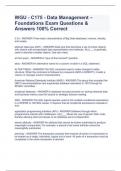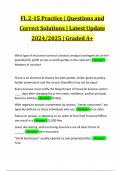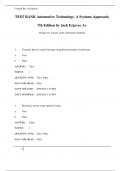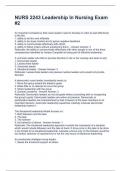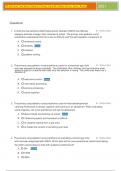Exam (elaborations)
WGU - C175 - Data Management – Foundations Exam Questions & Answers 100% Correct
- Course
- Institution
abstract data type (ADT) - ANSWER-Data type that describes a set of similar objects with shared and encapsulated data representation and methods. A(n)___ is generally used to describe complex objects. See also class. ad hoc query - ANSWER-A "spur-of-the-moment" question. alias - ANSWER-An alt...
[Show more]
